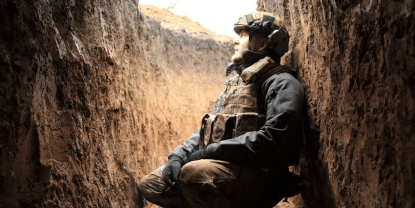In a conversation with online.ua, the Chief of Staff of the Russian Volunteer Corps Oleksandr with call sign "Fortuna" talked about the successful operation of Corp Fighters in Bryansk, the prison culture in the Russian army and the RVC's mission of dismantling the Putin regime and participation in a possible civil war in Russia.
The Russian Volunteer Corps is a military unit of ethnic Russians formed in August 2022 to fight against Russian Occupation Forces during the full-scale Russian invasion of Ukraine.
Since that time, the soldiers have been involved in a number of raids on the Belgorod region, battles as part of the Azov Territorial Defense Forces battalion in the Zaporizhzhia-Donetsk area, they show themselves during the defence of Avdiivka and were part of the military garrison on Zmiinyi (Snake Island) Island.
RVC liquidated FSB colonel in Bryansk region
I want to discuss with you the situation in the Bryansk region, when the corps fighters managed to eliminate the FSB colonel. How difficult is it to organise such operations and how long does it take to prepare them?
Let's put it this way: of course, we cannot disclose any details at the moment. If we are talking about the difficulty of organising such operations and the time required to prepare them, everything is very individual.
It all depends on some specific goals, depends on the region, so it's different everywhere.
But in any case, we try to be quite meticulous in our approach to each operation. And if it takes time to prepare, let's say not a week but two weeks, three weeks, a month, we would rather spend this time on proper training of people than try to do something quickly, "off the cuff".
How do such operations affect the morale of Russian army soldiers and the public opinion in Russia in general, both among the leadership and the population?
They have a negative impact. Firstly, if we look at the Russian army and the power structures within the Russian Federation in general, they are still conditionally built according to Soviet doctrine, meaning that there is a rather rigid hierarchy everywhere.
And when a high-ranking officer "goes out of action", this, of course, has a great impact on both the personnel and subordinates.
And, obviously, it affects the leadership, because they understand that they could also face a similar outcome under the right circumstances.
And there are many possible scenarios here: the management is afraid, of course, citizens are worried about their lives and health, people are starting to show up at work less often, and some on-site inspections are being carried out. So, to a certain extent, this is a loss of control, which means that there are far-reaching consequences that may not be immediately obvious.
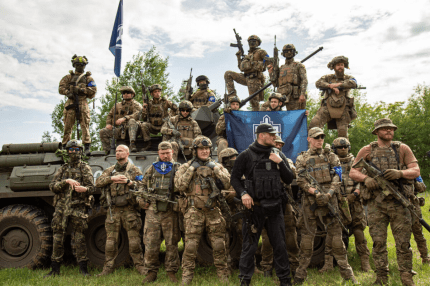
The Russian army is filled with a prison culture
Recently, mobilized occupiers in Crimea beat their commander to death, and later deserted. How would you describe the mood inside the Russian army today?
Let's put it this way: the Russian army is not a monolithic structure, as they are trying to show us, i.e. the Russian army is a conglomerate of different power clans, different conditional syndicates, and there is no unity there.
There are, of course, exemplary millitary units and formations, and there are people who have adopted a lot of their internal routine, everyday life, and systemic processes from their prison days.
We communicate quite a lot with prisoners, with prisoners of war from Storm Z, with prisoners who were conscripted, and there is this spread of prison culture into the army, it is now completely uncontrolled, and this, of course, has a very negative impact.
The attitudes, based on all these factors, are very different. If we take the average, the closer the ordinary performers — soldiers and personnel — are to the frontline, the lower the morale.
Advice for Russians from "Fortuna"
During our previous conversation, you recommended that Russians should watch training videos on how to roast dogs. Do you have any new recommendations?
Today's recommendation is probably the same for everyone: I would like to encourage everyone to take an interest in the "I Want to Live" project, familiarize themselves with it, see how it works, and follow the instructions indicated in all these materials.
Today, this is one of the best ways of how to surrender — save your life and try to make the right choice
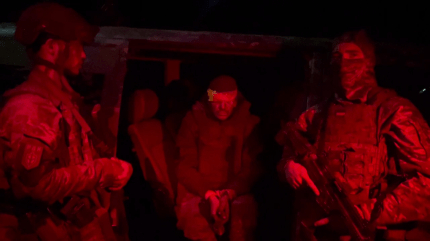
Will the death of Putin change the tide of the war?
Putin has announced that he is running for the presidency of the Russian Federation. Do you think he will have time to take this seat again, or are there chances that this will not happen?
There are, of course, chances that this may not happen, but in any case, it will not affect anything.
Whether he takes this place, whether he doesn't take this place, which Putin will take this place - this is all a story that will not affect anything globally.
There was also information that Putin had died, but then everyone played it down again. Do you think Putin is still alive? Could his death change the course of the war?
Let's just try to analyse this whole story. Let's imagine that Putin is not alive today. What would change? Absolutely nothing has changed.
If it happens that Putin suddenly dies, and it is known to a wide range of people, it is known to the public, that is, it is a publicised fact, then, of course, it will certainly affect the population of the Russian Federation, the population of Ukraine, and the mood on the frontline.
This will be a powerful fact of destabilisation. Until this happens, there is nothing to talk about.
But, again, we should not attach too much importance to this, because it will simply be a certain destabilising factor.
It will trigger certain processes of redistribution of the power market within Russia, it will simply accelerate the processes of confrontation within the elites, but nothing more.
Globally, this will not affect the situation at the frontline. That is, it will not happen that everyone will drop their weapons and run away. Everyone understands, after all.
So I wouldn't get hung up on all these conspiracy theories — If he's alive or dead... You need to work and mind your own business, and that's it.
Wagner's PMC and the redistribution of the mercanary market
Recently, it has been confirmed that Wagner PMC fighters were preparing Hamas for operations against Israel. Do you see any parallels in the tactics and actions of PMCs in Ukraine and, accordingly, Hamas in Israel?
Globally, there are certain similarities, but it is very difficult to say how much of an influence PMCs have. Here, the issue lies in a slightly different plane.
If we look at the tactics of the Wagner PMC on the territory of Ukraine, at the Ukrainian frontline, we are talking about the actions of some infantry units supported by vehicles. These are highly specific military reports, military stories on the frontline.
If we are talking about the Palestinian-Israeli conflict and the fighting in Gaza, it is a slightly different story. It is a large settlement, urban battles, battles in confined spaces, tunnels. And it is very difficult to find a trace of the Wagner PMC training school in the actions of Hamas.
There are some commonalities that can be superimposed on this. These include the use of drones, the use of various UAV defences, and the infiltration of militants across the border. It is clear that the methods and knowledge are drawn from the analysis of the war in Ukraine. But, perhaps, this is where the similarities end.
After Prigozhin's death, information emerged that his son led the Wagnerites in the Russian Guard and resumed their recruitment in Perm. In your opinion, will the son pay for his father's "sins" in front of Putin and his "retinue"?
I think not. Now, there is information that representatives of the Wagner Group who want to fight and are ready to fight can leave through the police, relatively speaking, through the Russia's National Guard.
There is a category of people who refused, a category of people who have doubts, and a category of people who agree. This category was simply divided into two parts: someone went to the Ministry of Defense and direct contract, and the rest was structurally redirected to Russia's National Guard.
It's just a redistribution of the market of militants and mercenaries. Someone took something from here, someone took something from there.
I don't think Prigozhin's son actually decides anything there. He was simply made a public figure responsible for this, but to what extent does he make decisions, to what extent does he bear real responsibility, to what extent can he change anything? I personally have doubts about this.
Is the world on the brink of World War III?
We have already discussed the topic of Hamas and Israel, and now more and more politicians and world leaders are saying that the world is on the brink of World War III. But there is little to no discussion of this topic from the military. What do you think about this?
I think that there are certain factors that indicate that the world is indeed on the brink of World War III. But I think this is no secret to anyone.
This includes China's confrontation with Taiwan, and, accordingly, with the United States. This is also a certain mood in Iran and in the Middle East and Asia in general.
Afghanistan is not a completely resolved issue after the withdrawal of US forces. There are a lot of destabilising centres in the world, and they are not getting smaller, they are getting bigger.
Therefore, to some extent, it is probably possible to argue that the world is on the verge of World War III. But these are rather speculative conclusions that, apart from philosophising on the subject, do not actually lead to anything.
In Russia, more and more people are willing to join the RVC
In Russia, it was believed that Prigozhin's mutiny was the first and last attempt at any action inside Russia. If civil war is inevitable, should the RVC take part in it?
Yes, the RVC should naturally take part in it in any case. And this is one of the goals, because it is one of the real and valid ways to unite a passionate population around you and start building something new.
By and large, we see the civil war as a kind of catalyst that will allow society to turn from the amorphous mass it is now into passionate people who are ready to change something, ready to act and ready to build something, to move somewhere, and people who continue to go with the flow.
Of course, there will be a need to unite these people around each other in order to develop all this further.
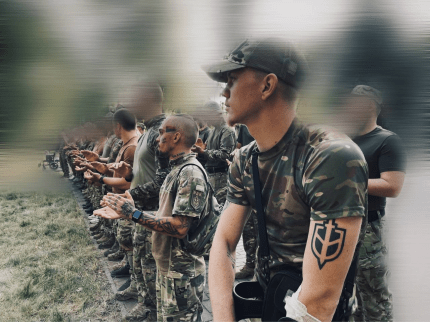
Are there many people in Russia who would like to fight for themselves, for example, in the ranks of the RVC or another anti-Putin organisation?
The number of people is growing. Of course, not at the pace we would like, but if you look at it from a historical perspective and take only the period of time since we appeared, when we declared ourselves and conducted our first operation on the territory of the Russian Federation in March, very little time has passed.
And now we are gaining momentum. More and more people in Russia are at least starting to think about these things. In our opinion, everything is going rather slowly, but from the point of view of historical processes, everything is going extremely fast.
We are, of course, trying to speed up this process. We are being approached by more and more people who are ready to join the RVC directly, ready to do something in the Russian Federation and help us. This process is gaining momentum and does not stop, and it is developing.
The RVC was created in front of your eyes. Does the main task of the corps remain "dismantling the current regime in Russia"?
One of the main tasks of the corps, and we do not go back on our words, is to dismantle the Putin regime - the existing Kremlin regime - in order to make room and space for the birth of something new.
How does recruitment process work?
Just two or three months ago, there was a talk about a thousand or two fighters in the RVC. How is recruiting going on now and what qualities should a candidate have?
From a recruitment point of view, we haven't changed much, I mean from a mechanism point of view.
Recruitment of people is carried out in a standard way. If a person wants to enter the RVC, they either write to us in a chatbot, or they can write through different social networks, but since so many people write, this message may simply get lost.
Therefore, I would advise everyone to write in a chatbot. There is a special form, the person writes there, then we send them various questionnaires, they fill them out, we begin to check the person remotely, and if at this stage the person suits us, then we begin to explain to them what their next steps are.
Everything largely depends on where they are located. If a person is on the territory of the Russian Federation, then this is one scenario, if in Europe — the second, if somewhere in third countries — the third one.
Then we gradually explain to the person where they should go, what to do, what they should look like, and throughout this entire route, we still provide various checks.
By and large, when we look at candidates, we say that the right motivation is the most important thing for us.
Essentially, at the moment, when we look at candidates, we say that the person’s motivation is most important to us, we need the right motivation. Because a whole new layer of people appeared who left Russia, including those who left for Europe, they spent a year and a half there, they began to run out of money and opportunities, and now they are simply trying to join somewhere somehow, just not stay alone with their problems.
And they are trying to pass off this false motivation as a true one, which is not entirely correct, we are still not a charitable organization, we are, first of all, a military unit. For us, motivation is the number one issue.
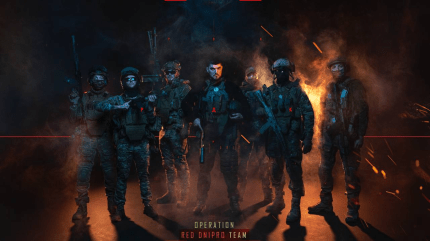
The second is the physical, moral, psychological state of a person and his applied qualities — whether a person knows how to do something useful within the framework of war, apart from direct combat stories.
If a person knows how to drive a car, repair a car, do some other things, it's all useful.
If a person has a good understanding of IT, circuit engineering, electricity, chemistry — we have a lot of possibilities here and all of them are very important.
The more a person knows and has skills, the more likely they are to join us. And that's all.
If a person suits us and we are interested in them, they join us and start a basic military training course.
After completing the course, they are assigned to a combat group based on their direction and specialization and finally go to the frontline.
And what would you like to say to those who are still thinking and doubting?
I would advise all people who want to, but have doubts, to start stopping hesitating, because it's been two years since people have been doubting, and one of the main questions I ask people who are now applying is: "Why are you turning now? Where have you been all this time, guys? The war didn't start yesterday, and you're only applying now. Why is that?".Therefore, if anyone has any doubts, I would suggest getting rid of these doubts as soon as possible.
The sooner a person who wants to join the Russian Volunteer Corps gets to us, the sooner they will start their military career, the sooner they will get to the frontline, the sooner they will start to live up to some of their own ideals, which are the reasons why most people join us.
Do Russian prisoners want to join the RVC?
Has the practice of Russian prisoners of war expressing a desire to join the RVC become more frequent?
The practice has become more frequent, but there is one very important point here, which is probably one of the most important in this history of communication with prisoners.
If a person who was captured and has the status of a prisoner of war refuses to be exchanged, they do not have many scenarios for the development of their future life.
Or they refuse the exchange and just sit and wait for the end of the war, that is, they are waiting, or they try to help with something, but do not fight — they work, do something else, maybe perform some useful activities, or they go to fight.
Since POW camps have a prison-like environment, I mean not in terms of keeping people, of course, but in terms of how they interact internally with each other, rumours spread very quickly in this environment.
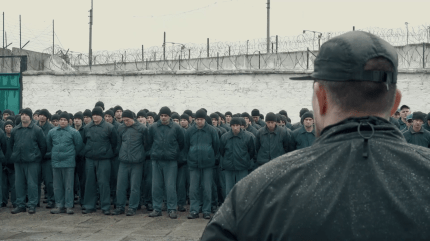
When people find out that someone has been admitted to us, they start saying that they would like to be admitted to us too.
Here comes a very important moment — our task is to understand how sincere the person is. That is, how much he really wants to come to us to fight, and not just to come to us to get very conditional freedom, not just to sit somewhere, but to be able to, I don't know, look at the sun, go somewhere other than the place where he is.
This is very important. Of course, we are doing a lot of work in this regard to separate those people who just want to sit out from those who really want to go to the frontline and fight.
The Russian security forces do not know what the RVC is
Russian TV channels began to talk about the RVC actively. The reports are mainly about the alleged Nazi views of the Corps' members and a clearly defined plan to destabilise the situation in Russia. How do you respond to such statements?
We respond with humor to such statements. First of all, what you said shows that the people there, I mean the security forces, do not know what the RVC is.
They have not yet engaged in any in-depth study of the issues, any analytics. All the information they have is essentially taken from open sources.
So, they are not dealing with us closely and systematically yet. They are working in a fire engine mode - something caught on fire, they ran to find out something and then report.
There is nothing surprising here either, this is a standard method of reporting: something happened, everyone was arrested, eliminated, a report was written, sent upstairs and everyone sleeps peacefully. There's no need to investigate, to find out what an RVC is, and to take any real countermeasures.
This is very good, because while people are sleeping there, we are working, we are developing, we are expanding, we continue to act and carry out more and more interesting actions and operations. This is the first thing.
Regarding our views, this is a purely Russian narrative, which many people pick up. But I don’t see anything surprising in this either, since any soldier of the Armed Forces of Ukraine is the same, from the point of view of the Russian Federation, a Nazi, a fascist, a Banderovets — anyone. That is, we are all in the same situation.
That is, we are in the same boat as everyone else here. And I have repeatedly said quite officially that in the ranks of the Russian Volunteer Corps there are people of very different political views, different colours of the political spectrum, and for us this issue is rather secondary, it is not primary.
What will we hear about RVC in the near future?
I will say this: I think that relatively soon there will be quite a lot of talk about the RVC. I will say this as Chief of Staff: in terms of development, we are now trying to grow as fast as possible, more and better, and we are using all our resources, all the time, all our strength.
The RVC is now developing rapidly as a military unit, as a military-political platform, and as some social initiatives.
We are now trying to develop in all directions, but to do so efficiently, so as not to look weird and not to have to redo it later.
We have social projects, we have political projects, we have military projects. We are currently in a phase of rapid growth. We are trying to do this mainly, except, of course, for certain operations at the frontline.

